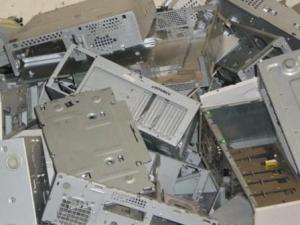
In a Special Report published on 09 December, UK charity Computer Aid International calls for IT manufactures to take responsibility for the environmental cost of their products throughout their entire life-cycle.
The Special Report, which is the third in a series of special reports on ICTs and the Environment, is titled “GreenICT: What producers must do”.
The report argues that most environmental damage of computing happens during manufacturing; for instance, 80% of the energy used over your PC’s lifecycle is used before you switch it on for the first time. For this reason, the report argues, Green IT debates need to focus on poor practice and pollution in production. From mining materials and the excessive use of toxic chemicals in production to the enormous carbon footprint of manufacturing and its global sourcing and distribution chains, the report highlights the need to hold producers accountable for the true environmental cost of computing.
The Special Report draws upon research from various sources to argue that IT manufacturers need to ensure more environmentally friendly design in the production stage and that they need to take responsibility for the end of life treatment of IT equipment in all countries and not just in Europe where legislation enforces this.
According to Tony Roberts, Founder and CEO of Computer Aid International, “In Europe all ICT manufactures including HP, Samsung, Nokia and Apple have a legal duty to fund the end of life recycling of equipment that they produced. Within Europe manufacturers fulfill this requirement of corporate social responsibility and are justifiably proud of their green credentials. However we would argue that they have exactly the same moral obligations where their products are sold in Africa, Asia and elsewhere. Most developing countries are entirely without the kind of facilities necessary to re-use and recycle ICTs and to recover the precious metals and other composite materials before they pollute the environment and threaten public health and safety.”
The report recommends the implementation of Europe’s Extended Producer Responsibility (EPR) principle globally:- Producers should be responsible for the end-of-life management of their goods in all countries they operate in, not just in rich developed countries, so that all nations can build the operational capacity to re-use IT equipment and to recycle e-waste.
- Shift the cost of toxic, wasteful design away from communities and the environment to the producer.
- Producers must be forced to include the real costs of their goods through wide-ranging EPR programmes that encourage eco-design.
According to Haley Bowcock, Environmental Advocacy Officer at Computer Aid, “The growing e-waste crisis demands of us a fundamental rethink of how we design, use and dispose of electronic equipment.ICT and other electronics manufacturers are really in the hot seat to lead a new resourcing paradigm by making longer-lasting products which are easier to repair and upgrade and eventually recycle. EPR programmes encourage this; they also ensure communities aren’t picking up the tab for toxic wasteful design. So it’s really important that producers support EPR programmes globally, which will help all nations build capacity for the safe – and fair – treatment of end-of-life electronics.”
Computer Aid International is a leading non-profit provider of ICT for development, having professionally refurbished over 175,000 PCs for use in schools, hospitals and community projects in more than 100 countries such as Rwanda, Chile and Zambia.